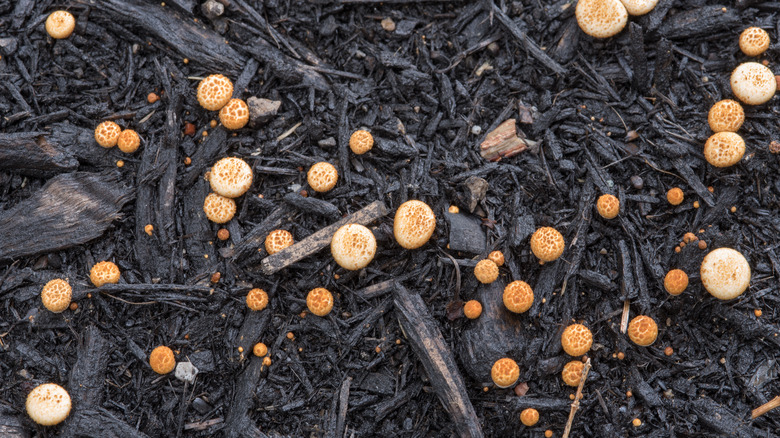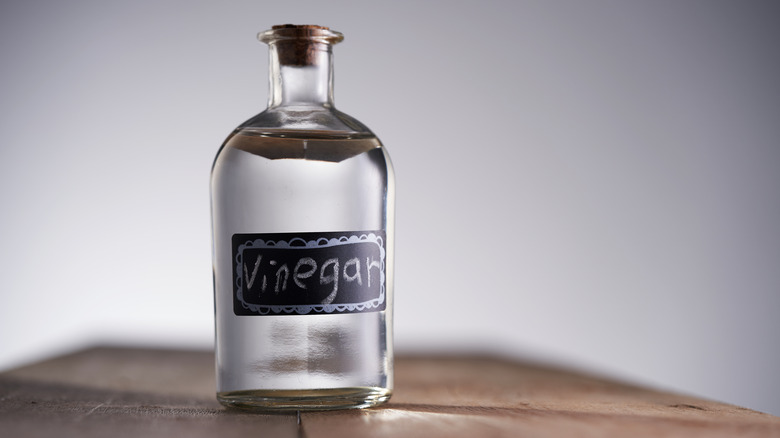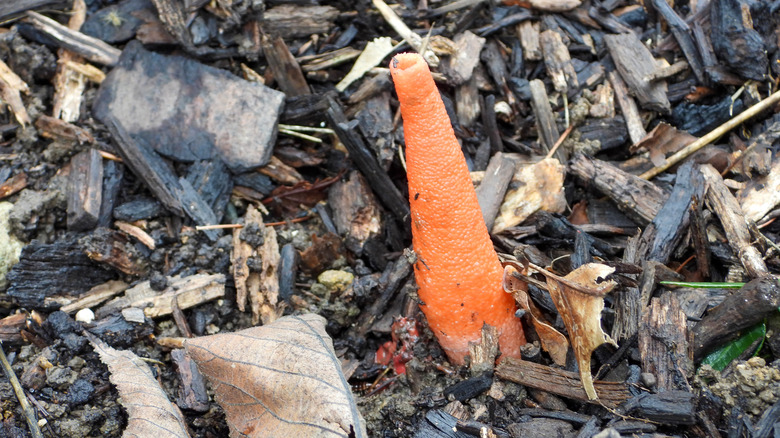Should You Use Vinegar To Kill Fungus In Your Mulch?
If you find mushrooms or other strange fungi growing in your mulch, you might be worried that they'll harm your plants — and you probably want to keep the fungus out of your garden. While some studies have shown that white vinegar is capable of killing certain fungi because of the antifungal properties of acetic acid, others found that it's ineffective against others. With this in mind, you can try using vinegar to eliminate the fungus on your mulch, but there is a chance it won't be effective. Additionally, vinegar could harm your plants if it comes into contact with them and will increase the acidity of the soil where it's applied.
Rather than spraying your mulch with vinegar, you may consider digging up and getting rid of the affected mulch, pulling the mushrooms out of the ground, raking the mulch, or simply letting it be. Surprisingly, not all fungi growing on your mulch will harm your plants, and some can actually be good for your landscape by getting rid of bacteria and adding nutrients to the soil.
Why vinegar might not kill fungus in your mulch
A 2020 study published in Pure and Applied Biology showed that distilled white vinegar was an efficient antifungal against Cryptococuss neoformans and Sarocladium kiliense. On the other hand, a 2015 study published in the International Journal of Environmental Research and Public Health found that vinegar was only capable of slowing the growth of one fungus tested — Penicillium chrysogenum — and it was concluded that vinegar is not an effective antifungal against all fungi. Based on this research, there is a chance that vinegar could kill the mushrooms or fungus growing in your mulch, but it depends on a variety of factors, such as the type of fungus and the concentration of acetic acid in the vinegar.
The fungi most likely growing on your mulch are artillery fungus (Sphaerobolus), bird's nest fungi (Crucibularium), toadstool mushrooms, stinkhorns (Mutinus), and slime molds (Physarum), though this is technically an amoeba and not a fungus. While toadstool mushrooms are sometimes poisonous when ingested and artillery fungus can produce annoying, sticky spores that fly everywhere and leave stains, none of these nuisance mushrooms are a danger to your plants. For example, slime mold eats the bacteria on mulch. Of course, you may still want to rid your yard of mushrooms, especially if you have curious pets or children who might eat them.
Killing the fungus in your mulch
If you'd like to test the vinegar method to see if it works for you, try applying regular household vinegar — which usually contains just 5% acetic acid — over the affected mulch. Once it has dried, use a rake to redistribute your mulch. Otherwise, you can easily take care of unwanted slime mold and other fungi by digging up the affected mulch, bagging it in a biodegradable container, and throwing it away. If you place the affected mulch in another area of your yard, the fungus will likely just grow there instead. Additionally, be sure to scoop up a little mulch around the visible fungus to try to get rid of any spores it could have produced.
In the future, prevent nuisance fungi by adding mushroom compost to your mulch, which has been shown to ward off artillery fungus when the compost makes up 40% of the mixture. With some types of fungus, you might be able to just yank the mushrooms out of the mulch, though there is a chance they could grow back. Raking your mulch regularly can also help keep it drier, which makes the environment less pleasurable to fungi. You might also consider using a different kind of mulch that will make it harder for the fungus to grow. For example, pine bark nuggets aren't a great spot for artillery fungus.


